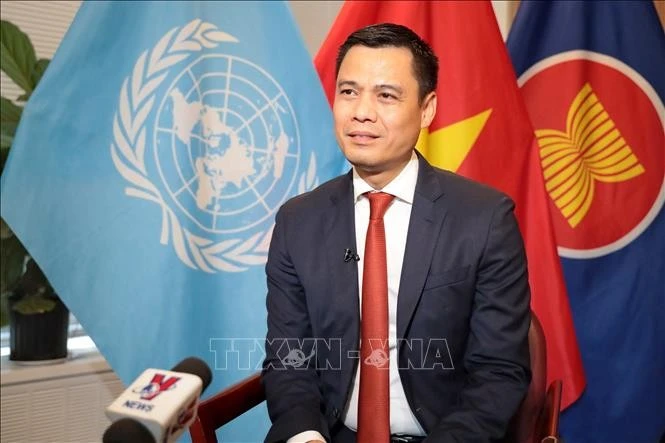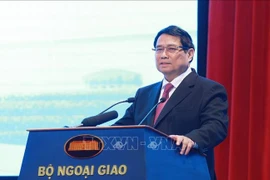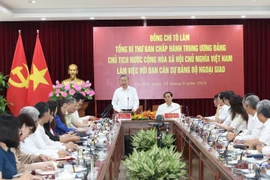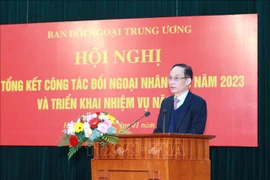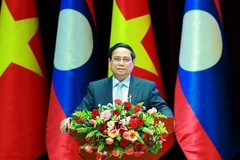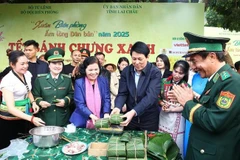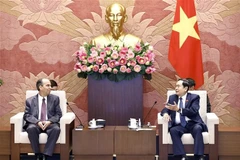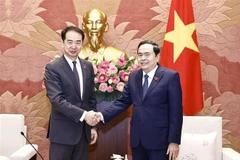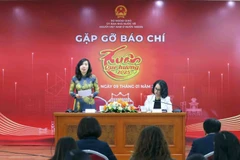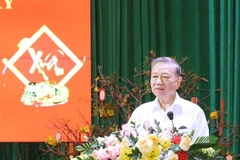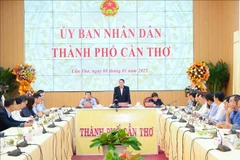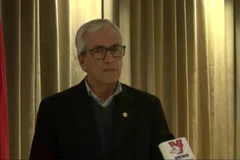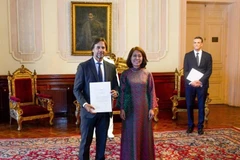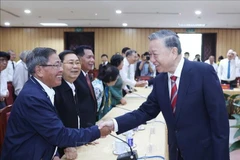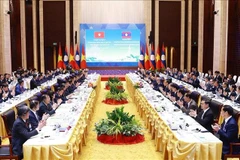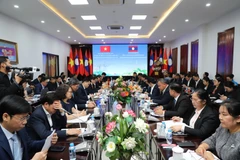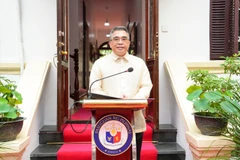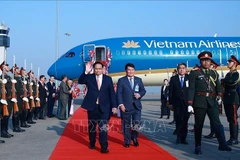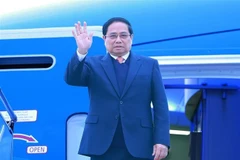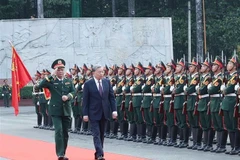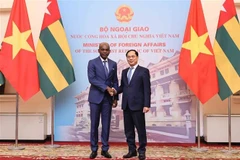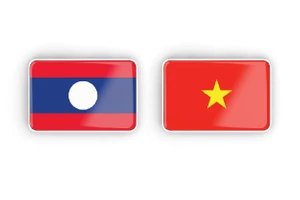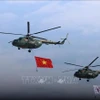New York (VNA) - Vietnam's diplomatic sector achieved many important results in 2024, making substantial and meaningful contributions to the overall achievements of the country, including prominent contributions through multilateral diplomatic activities, particularly at the United Nations, according to Ambassador Dang Hoang Giang, Permanent Representative of Vietnam to the UN.
Vietnam affirms position as an active, responsible, and reliable member of the international community
Talking to the Vietnam News Agency’s reporters in New York, Giang affirmed that the year 2024 continued to mark significant milestones in the maturation of Vietnam's multilateral diplomacy, strongly affirming its position as an active, responsible, and reliable member of the international community.
Firstly, the diplomat stated that the highlight of Vietnam's multilateral diplomacy last year was the historic participation of a General Secretary of the Communist Party of Vietnam in the High-level General Debate of the United Nations General Assembly (UNGA) and the Summit of the Future in September. With the important message of strengthening multilateralism, acting together to build a peaceful, stable, prosperous, and sustainable future for all citizens, To Lam, in his position as Party General Secretary and State President, strongly reaffirmed Vietnam's foreign policy of independence, self-reliance, multilateralism, diversification, and proactive and active international integration in a comprehensive, intensive and effective manner. This message reflects Vietnam's aspirations in the era of the nation’s rise, and conveys an image of the nation as a peaceful, stable, friendly, dynamic, innovative, reliable, and responsible member of the international community.
At the summit, Lam shared Vietnam's vision and solutions on major global issues, particularly the need to strengthen investment in medical research, education and training, digital transformation, and green transition for sustainable development. He reaffirmed the country's commitment to contributing to joint efforts to build a peaceful world, promoting equitable development, and improving the welfare and happiness of humanity.
The Vietnamese leader’s first direct participation in high-level UN conferences and events reflected the Party and State's deep respect for and attention to multilateral cooperation, the key agendas of the UN, and Vietnam's comprehensive relationship with the organisation, Giang affirmed.
Secondly, many important initiatives bearing Vietnam's signature have been approved and effectively implemented by the UN, showcasing its proactive role as a key player in shaping multilateral institutions. A highlight of the multilateral initiatives in 2024 was Vietnam's efforts to have Hanoi selected as the host city for the signing ceremony of the Convention against Cybercrime in 2025. This represents a significant milestone in Vietnam-UN cooperation, as it marks the first time a Vietnamese location is linked with an important international convention, and officially recognised in the convention's title and text. This also opens up an opportunity for Vietnam to take a leading role in a field of great interest to the international community, particularly in addressing the negative aspects of information technology.
At the UN, Vietnam proposed, chaired, and promoted the initiative to recognise June 11 as International Day of Play, which was co-sponsored by 138 countries. It highlights the crucial role of play in the physical and psychological development of children and in social progress.
Over the past year, Vietnam has proactively and actively participated in and made substantial contributions to major UN processes, thus helping ensure the protection of national interests by integrating its key priorities and concerns, such as maritime security and safety, climate change adaptation, disaster risk reduction, food and water security, sustainable economic development, and digital transformation, Giang stated.
Thirdly, Vietnam was elected to key policy-making bodies at the UN, including the Executive Board of UN Women for the 2025-2027 term in April, and the UN Commission on International Trade Law (UNCITRAL) for the 2025-2031 term in November, with high votes. These reflected the recognition and appreciation from UN member states and the international community for Vietnam's achievements, policies, and positive contributions in promoting gender equality and developing international trade law.
Fourthly, Vietnam continued to strengthen its participation in UN peacekeeping operations, contributing to collective efforts to maintain international peace and security, Giang said, adding that 2024 also marked the 10th anniversary of Vietnam's involvement in these missions, and the country's peacekeeping forces have steadily grown in both quantity and quality.
Notably, the proportion of female military personnel is higher than the UN's average and has been steadily increasing, reflecting the growing participation, voice, and role of women in international peace and security issues. In August 2024, the government officially launched the first National Action Plan on Women, Peace, and Security (WPS), making Vietnam the third country in ASEAN to do so. This marks a historic milestone in Vietnam's commitment to gender equality and empowering women in the fields of peace and security, which has been widely recognised and appreciated by the international community.
Fifthly, despite facing numerous challenges, the nation continued to achieve significant socioeconomic accomplishments, contributing to the realisation of the UN's shared goals. With the Party and State’s consistent policy of placing people at the centre of development policies, the nation's socioeconomic efforts and achievements strongly affirmed its commitment to its international pledges on promoting sustainable development and ensuring human rights, Giang affirmed.
The ambassador went on to say that Vietnam entered the group of the 40 largest economies in the world, with export turnover estimated at 800 billion USD in 2024. On the international stage, it is recognised as a bright spot in achieving the Sustainable Development Goals (SDGs). In 2024, Vietnam's Sustainable Development Index (SDI) reached 73.32 points, higher than the global average, ranking it second in Southeast Asia.
At the UN Human Rights Council, in addition to proposing the annual signature resolution on climate change and human rights, Vietnam also promoted a series of initiatives prioritising the protection of vulnerable groups. This was reflected through leading joint statements on the protection of essential civilian infrastructure in armed conflict and on gender equality and the SDGs, and advancing dialogues on the protection of vulnerable groups in cyberspace and human rights in the context of smart city development.
Sixthly, Vietnam continued to uphold its principled stance, demonstrating responsibility towards the common concerns of the international community. It was a leading nation in supporting multilateralism and a multilateral approach to addressing global challenges, fostering unity and cooperation rather than division and confrontation. Vietnam also contributed its strong voice in opposing acts of aggression, political coercion, and unilateral sanctions in international relations, not only at the UN but also at many other multilateral forums and frameworks.
The year 2024 also witnessed Vietnam's effective participation in the processes of negotiating, developing, and codifying international law. Notably, Vietnam contributed to completing the process of developing the Convention against Cybercrime after more than five years of negotiations, presented its national views at the International Court of Justice (ICJ) regarding states' responsibility for climate change, participated in the International Law Commission's (ILC) research on sea level rise and other emerging legal issues, actively engaged in discussions, and co-sponsored resolutions on building a governance framework for Artificial Intelligence (AI) and cybersecurity.
Giang affirmed that these milestones in multilateral diplomacy at the UN are of significant importance, as they represent concrete steps in implementing Vietnam's foreign policy of independence, self-reliance, multilateralism, diversification, and proactive and comprehensive international integration. These activities have contributed to protecting and promoting national interests, especially in maintaining a peaceful and stable environment for national development, safeguarding independence, sovereignty, and territorial integrity, and ensuring the protection of the country early and from afar.
Multilateral diplomacy has further enhanced the country's position and prestige, demonstrating its steadfast commitment to its principled stance, advocating for the rule of law, and showcasing its role as a responsible member of the international community as well as its readiness to contribute to building a peaceful, prosperous, and better world for all people and all nations. At the same time, multilateral diplomacy continues to be leveraged to deepen bilateral relations with key partners, particularly those of great significance to Vietnam, said the diplomat.
Looking towards 2025 and the new era of the nation’s rise
In 2025, the international situation is forecast to continue to evolve in complexity due to the increasing geopolitical tensions, and deepening economic and technological changes. The year also marks a historic moment, as both the United Nations and Vietnam will celebrate their 80th founding anniversary.
For the UN, this will be an opportunity to prioritise review, self-assessment, and drawing lessons while looking toward the future. For Vietnam, the country stands on the threshold of a new historic beginning. From a land ravaged by wars, Vietnam has risen to become a symbol of peace and stability, with expansive international relations and an economy ranked 35th in the world. The nation's strength and influence continue to be reinforced and enhanced. These tremendous achievements serve as the foundation for Vietnam to enter a new era - the era of the nation’s rise.
According to the diplomat, the current situation presents many challenges, but at the same time, provides opportunities for Vietnam to further demonstrate and enhance its role as an active and responsible member, and its readiness to shoulder the responsibility of contributing to peace, stability, and development in the region and across the world.
In that spirit, in the coming period, Vietnam will continue to fulfill its commitment to promoting multilateralism, respecting international law and the UN Charter, strengthening its role and elevating its contributions. It will do this in terms of solutions and finances, to addressing global issues at the UN. It will enhance timely and effective responses to global challenges, and actively contribute to maintaining peace and stability in the region and the world. This will work to preserve a peaceful environment, facilitating and attracting more resources for the country's development, and shaping the future of Vietnam, the region, and the world, Giang stressed./.
